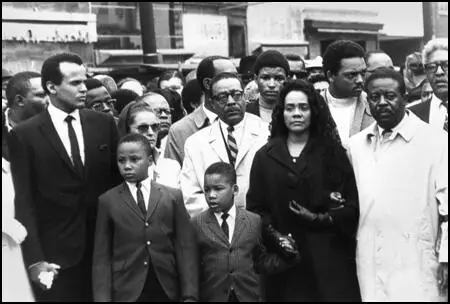On this day on 4th April
On this day in 1581 Francis Drake is knighted by Queen Elizabeth I for completing a circumnavigation of the world. The journey began on 13th December 1577. Drake's ship was the 150 ton Pelican (renamed the Golden Hinde half-way through the journey) double-planked, lead-sheathed, and armed with 18 guns. Wynter contributed his own 80 ton Elizabeth, which carried 11 guns. Another 12 guns were distributed among the 50 ton Marigold, the 30 ton Swan, and the 15 ton Benedict.
By the end of the month six Spanish and Portuguese ships were taken, then looted and eventually set free. Drake also abandoned the Benedict and took one of the Spanish vessels, which was renamed Christopher. The following month they captured a Portuguese merchant vessel, Santa Maria. The commander was Nuño de Silva, who knew the coast of South America. Drake took Silva to serve as pilot of his own fleet.
In June 1578 the fleet arrived at Puerto San Julián, on the southern coast of Argentina, where Drake put Thomas Doughty on trial for mutiny. He was beheaded on 2nd July 1578. Drake feared that others would rebel and so he called the captains and crew together, then announced that all the officers, who held their appointments from the owners of the ships, were relieved of command. He then reappointed them or most of them as officers responsible only to him.
When Drake finally led his fleet through the strait and into the Pacific Ocean, Captain John Wynter took advantage of a storm to leave Drake and took his ship back to England. The Marigold, commanded by Doughty's friend John Thomas, also disappeared, and the Mary was abandoned at Puerto San Julián. Drake, who was left with only the Pelican, renamed it The Golden Hind. Drake now sailed up the Pacific coast. At Valparaíso he took a ship carrying 200,000 pesos in gold, then went ashore and raided the church and the warehouses.
On 5th February 1579 he arrived at Arica on the north coast of Chile and captured a merchant ship carrying thirty or forty bars of silver. As a result of deaths in battles and sickness, Drake's crew to little more than seventy men. Only thirty of them were fit to fight, but that was enough, since the merchant ships Drake took were unarmed. On 1st March he captured the richest ship of all, Nuestra Señora de la Concepción, carrying valuable cargo and 362,000 pesos in silver and gold.
Sailing along the coast of Mexico, Drake took a few more ships and raided several more ports. However, The Golden Hinde was leaking badly and needed to be careened. On 17th June 1579 Drake landed in a bay on the the coast of California. According to Drake's biographer, Harry Kelsey: "Sixteenth-century accounts and maps can be interpreted to show that he stopped anywhere between the southern tip of Baja California and latitude 48° N." Most historians believe that Drake had stopped in a bay on the Point Reyes peninsula (now known as Drake's Bay).
Father Francis Fletcher, the chaplin to the expedition, later wrote in The World Encompassed by Sir Francis Drake (1628): "Drake's ship entered a convenient and fit harbour." Drake has been reported as saying: "By God's Will we hath been sent into this fair and good bay. Let us all, with one consent, both high and low, magnify and praise our most gracious and merciful God for his infinite and unspeakable goodness toward us. By God's faith hath we endured such great storms and such hardships as we have seen in these uncharted seas. To be delivered here of His safekeeping, I protest we are not worthy of such mercy."
Francis Drake's cousin, John Drake, argued that "Drake... landed and built huts and remained a month and a half, caulking his vessel. The victuals they found were mussels and sea-lions." A local group of Miwok brought him a present of a bunch of feathers and tobacco leaves in a basket. John Sugden, the author of Sir Francis Drake (1990) has argued: "It appeared to the English that the Indians regarded them as gods; they were impervious to English attempts to explain who they were, but at least they remained friendly, and when they had received clothing and other gifts the natives returned happily and noisily to their village." John Drake claims that when they "saw the Englishmen they wept and scratched their faces with their nails until they drew blood, as though this was an act of homage or adoration."
Francis Fletcher suggests that the local people "dispersed themselves into the country, to make known the news." On 26th June a large group of Miwok arrived at Drake's camp. The chief, wearing a head-dress and a skin cape, was followed by painted warriors, each one of whom bore a gift. At the rear of the cavalcade were women and children. A man holding a sceptre of black wood and wearing a chain of clam shells, stepped forward and made a thirty minute speech. While this was going on the women indulged in a strange ritual of self-mutilation that included scratching their faces until the blood flowed. Robert F. Heizer has argued in Elizabethan California (1974) that self-mutilation is associated with mourning and that the Miwok probably thought the British sailors were spirits returning from the dead. However, Drake took the view that they were proclaiming him king of the Miwok tribe.
John Drake pointed out in a statement he made in 1582: "During that time (June, 1579) many Indians came there and when they saw the Englishmen they wept and scratched their faces with their nails until they drew blood, as though this was an act of homage or adoration. By signs Captain Francis Drake told them not to do that, for the Englishmen were not God. These people were peaceful and did no harm to the English, but gave them no food. They are of the colour of the Indians here and are comely. They carry bows and arrows and go naked. The climate is temperate, more cold than hot. To all appearance it is a very good country."
Drake now claimed the land for Queen Elizabeth. He named it Nova Albion "in respect of the white banks and cliffs, which lie towards the sea". Apparently, the cliffs of Point Reyes reminded Drake of the coast at Dover. Drake had a post set up with a plate bearing his name and the date of arriving in California.
When the The Golden Hinde left on 23rd July, the Miwok exhibited great distress and ran to the hill-tops to keep the ship in sight for as long as possible. Drake later wrote that during his time in California, "not withstanding it was the height of summer, we were continually visited with nipping cold, neither could we at any time within a fourteen day period find the air so clear as to be able to take height the sun or stars."
Francis Drake then sailed along the California coast but failed to see the Golden Gate and San Francisco bay beyond. This is probably because the area is often shrouded in fog during the summer. The heat in the California Central Valley causes the air there to rise. This can create strong winds which pull cool moist air in from over the ocean through the break in the hills, causing a stream of dense fog to enter the bay.
At Java Drake and his crew loaded plenty of food they sailed through the Indian Ocean, and around the Cape of Good Hope. The provisions lasted until 20 July 1580 when they reached Sierra Leone on the African coast. When Drake arrived in Plymouth on 26th September 1580, he became the first Englishman to circumnavigate the world. Drake return to England as a very wealthy man and he was able to purchase the Buckland Abbey estate. In 1581 Queen Elizabeth knighted Drake and later that year he was elected to the House of Commons.
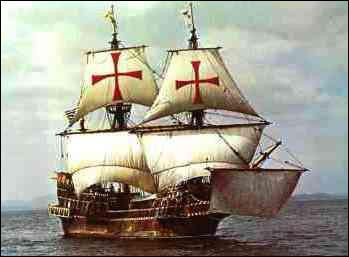
On this day in 1792 Thaddeus Stevens was born in Danville, Vermont. After graduating in 1814 he was admitted to the bar and practised in Pennsylvania. A strong opponent of slavery, he defended a large number of fugitives without a fee.
A member of the Whig Party, he was elected to the State Legislature (1833-41) and the House of Representatives (1849-53) where he played a leading role in the campaign against the Fugitive Slave Act passed in 1850.
After the demise of the Whig Party, Stevens joined the Republican Party and was elected to Congress in 1859. He fully supported Abraham Lincoln during the Civil War but after his death in 1865 he increasingly came into conflict with the new president, Andrew Johnson.
Stevens helped draft the Fourteenth Amendment to the Constitution and the Reconstruction Act in 1867. He argued in Congress that Southern plantations should be taken from their owners and divided among the former slaves. As leader of the Radical Republicans in Congress, Stevens proposed the resolution in 1868 for the impeachment of Andrew Johnson.
Stevens health declined during his dispute with Andrew Johnson and he began making preparations for his funeral. This included the request that he should be buried among African Americans in Lancaster, Pennsylvania.
Thaddeus Stevens died on 11th August, 1868. Inscribed on his tombstone were the words: "I repose in this quiet and secluded spot, not from any natural preference for solitude; but finding other cemeteries limited as to race, by charter rules, I have chosen this that I might illustrate in my death the principles which I advocated through a long life, equality of man before the Creator".
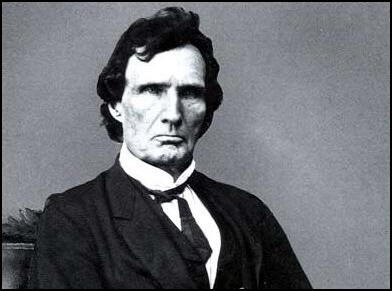
On this day in 1802 feminist campaigner Dorothea Dix was born in Hampden, Maine. At the age of 12 she went to live with her grandmother in Boston. Within two years she was teaching in a school in Worcester.
In 1821she opened her own school for girls in Boston. Over the next few years she wrote school textbooks and a hymn book. Dix ran the school until 1834 when suffering from tuberculosis she decided to retire.
Dix spent the next few years studying the conditions in prison and insane asylums in Massachusetts. She discovered that a large number of people suffering from mental illness were confined in prisons and were receiving no medical treatment. Even in mental asylums the patients were often confined in cages and bound with ropes and chains. Shocked by what she discovered, Dix decided to compare conditions in these institutions with other countries. She visited Europe and from 1842-1845, Dix travelled more than 10,000 miles during her investigations.
In January, 1843, Dorothea Dix submitting to the Massachusetts legislature a detailed report on her investigations. Her ideas influenced the reform of the Worcester Insane Asylum. Her book, Remarks on Prisons and Prison Discipline in the United States was published in 1845. By 1854 Dix had helped to establish mental hospitals in eleven states. She had also founded hospitals in Russia, Turkey, France and Scotland.
On the outbreak of the American Civil War Dix was appointed as superintendent of women nurses for the federal government. Over the next four years she was responsible for the recruitment, training and placement of 2,000 nurses treating members of the Union Army.
After the war Dix resumed her work for the mentally ill. This included travelling widely in Europe and Japan. Dorothea Dix died in Trenton, New Jersey, on 17th July, 1887.
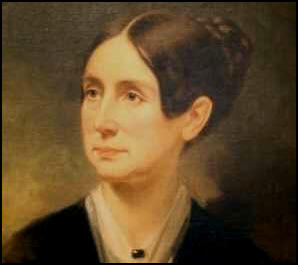
On this day in 1868 Philippa Fawcett, the daughter of Millicent Garrett Fawcett and Henry Fawcett, was born in London. According to her biographer, Rita McWilliams Tullberg: "Philippa Fawcett's political and intellectual inheritance was formidable. Both her parents were active in the movement for the higher education of women. Not yet two years old, she reportedly toddled among the group of senior academics and their wives meeting in her parents' drawing-room in Cambridge in 1869 to plan the scheme of lectures for women that led, in time, to the foundation of Newnham College."
Philippa attended Clapham High School. Her teachers were very impressed with her abilities as a mathematician and at fifteen it was arranged for her to receive coaching from George Barnes Atkinson of Trinity Hall College. From 1885 to 1887 she attended courses at University College, in pure and applied mathematics and mechanics, and she also studied chemistry at Bedford College before being awarded a Winkworth scholarship to study mathematics at Newnham College.
In June 1890, Philippa Fawcett became the first woman to score the highest mark of all the candidates for the Mathematical Tripos at the University of Cambridge. This news produced a great deal of excitement at Newnham, and was widely reported in the national press. The following year she sat part two of the tripos, which was considered to demand more originality and ingenuity of candidates. Once again she showed her talent by being placed, together with Geoffrey Thomas Bennett, the male senior wrangler of her year, alone in the first class. As Rita McWilliams Tullberg points out: "Bennett was made a fellow of St John's College, awarded the university prize for mathematics, and lectured for the university. Fawcett was not eligible for any such lucrative posts or prizes."
In 1901 Millicent Garrett Fawcett headed a government commission of women inquiring into conditions in British concentration camps in South Africa. She took her daughter on the trip and the following year she return to the Transvaal to help establish the school system there. This included training mathematics teachers in Johannesburg.
Philippa Fawcett returned to England in 1905 to take up the post of principal assistant in Education Department of the London County Council (LCC). She became responsible for existing secondary schools and developed new ones established under the 1902 Education Act.
A member of the National Union of Women's Suffrage Societies, Fawcett was involved in the struggle for the enfranchisement of women. In her autobiography, Mary Sheepshanks writes about how she went with Fawcett to speak in Bicester: "While we were out at a meeting some young men, sons of neighbouring squires, broke into our bed-rooms and made hay of them. A few days later I had friends to dinner in London, including Joseph Wedgewood, who had previously rescued me and a friend from an angry election crowd in the Potteries. He took up the matter in the House of Commons, and the Home Secretary undertook to look into it... The father of one of the young men offered an apology - provided I would not say I had received one."
As a public servant, Fawcett generally kept a low profile during the suffrage campaign. After the First World War she was a prominent supporter of the League of Nations Union. She was also active in the London and National Society for Women's Service (renamed the Fawcett Society in 1953). Philippa Fawcett died in London on 10th June 1948.
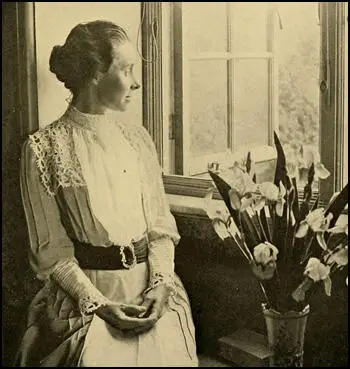
On this day in 1881 the birth of Eileen Casey, the daughter of Dr. Phillip Forth Casey and Isabella Julia Agnes Raey, was born in Deniliquin, New South Wales, Australia, on 4 April 1881. In March 1890 her father's job moved the family back to Europe and lived in Göttingen, Germany. The family eventually moved back to England.
After hearing Emmeline Pankhurst speak in 1910 Eileen and her mother, Julia Casey, joined the Women's Social and Political Union (WSPU). Its newspaper reported: "Miss Eileen Casey, an Australian has much time to the service of the Union, especially in selling the paper as Captain of the Victoria Pitch. As a native of a land where women have the vote, she writes that she objects most strongly to the appointment of Mr. Lewis Harcourt as Secretary of the Colonies."
Eileen and her mother both sold Votes for Women outside Victoria Station. One day "a female passer-by whom we suspected of being a provocateur tore the paper out of my mother's hand but my mother caught her scarf and when she demanded to let go my mother said, 'yes when you pay me the price'."
On 18th November 1910, Casey took part in a demonstration at 10 Downing Street against the failure of Herbert Asquith and his government to pass legislation to give women the vote. Votes for Women reported that 159 women and three men were arrested. This included Casey, Catherine Marshall, Eveline Haverfield, Anne Cobden Sanderson, Mary Leigh, Vera Holme, Louisa Garrett Anderson, Kitty Marion, Clara Giveen, Ada Wright, Lilian Dove-Wilcox and Grace Roe.
Sylvia Pankhurst described what happened that day: "As, one after the other, small deputations of twelve women appeared in sight they were set upon by the police and hurled aside. Mrs Cobden Sanderson, who had been in the first deputation, was rudely seized and pressed against the wall by the police, who held her there by both arms for a considerable time, sneering and jeering at her meanwhile.... Just as this had been done, I saw Miss Ada Wright close to the entrance. Several police seized her, lifted her from the ground and flung her back into the crowd. A moment afterwards she appeared again, and I saw her running as fast as she could towards the House of Commons. A policeman struck her with all his force and she fell to the ground. For a moment there was a group of struggling men round the place where she lay, then she rose up, only to be flung down again immediately. Then a tall, grey-headed man with a silk hat was seen fighting to protect her; but three or four police seized hold of him and bundled him away. Then again, I saw Miss Ada Wright's tall, grey-clad figure, but over and over again she was flung to the ground, how often I cannot say. It was a painful and degrading sight. At last, she was lying against the wall of the House of Lords, close to the Strangers' Entrance, and a number of women, with pale and distressed faces were kneeling down round her. She was in a state of collapse."
In March 1912, Eileen Casey along with Olive Walton smashed the windows of Marshall and Snelgrove's shop in Oxford Street. They served two weeks on remand before being sentenced to four months and while in prison joined in the hunger-strike and was forcibly fed. Isabella Casey was also sent to prison for a month for breaking the window of a barber's shop. When a neighbour commiserated with D. Phillip Casey he said: "Well, if they want the vote they are right to fight for it."
At a meeting in France in October, 1912, Christabel Pankhurst told Frederick Pethick-Lawrence and Emmeline Pethick-Lawrence about the proposed arson campaign. When they objected, Christabel arranged for them to be expelled from the organisation. Emmeline later recalled in her autobiography, My Part in a Changing World (1938): "My husband and I were not prepared to accept this decision as final. We felt that Christabel, who had lived for so many years with us in closest intimacy, could not be party to it. But when we met again to go further into the question… Christabel made it quite clear that she had no further use for us."
As Fern Riddell has pointed out: "From 1912 to 1914, Christabel Pankhurst orchestrated a nationwide bombing and arson campaign the likes of which Britain had never seen before and hasn't experienced since. Hundreds of attacks by either bombs or fire, carried out by women using codenames and aliases, destroyed timber yards, cotton mills, railway stations, MPs' homes, mansions, racecourses, sporting pavilions, churches, glasshouses, even Edinburgh's Royal Observatory. Chemical attacks on postmen, postboxes, golfing greens and even the prime minister - whenever a suffragette could get close enough - left victims with terrible burns and sorely irritated eyes and throats, and destroyed precious correspondence."
On 30th April 1913 the police raided the WSPU's office at Lincoln's Inn House. As a result of the documents found several people were arrested including (editor of the The Suffragette), Edwy Godwin Clayton, Flora Drummond, Annie Kenney, Harriet Kerr (office manager), Beatrice Sanders (financial secretary), Geraldine Lennox (sub-editor) and Agnes Lake (business manager).
When he was arrested Clayton said: "I think this is rather a high-handed action. I am an extreme sympathizer with the Suffragette causes. What evidence have you against me?" He confirmed he had written the letter but refused to comment on the contents. The letter read: "Dear Miss Kenney, I am sorry to say it will be several days yet before I can be ready with which you want. I have devoted all this evening and all of yesterday evening to the business without success. Evidently it is a difficult matter, but not impossible. I nearly succeeded once last night and then spoilt what I had done in trying to improve upon it. By next week I shall be able to manage the exact proportions, and I will let you have the results as soon as I can. Please burn this."
During the trial Matthias McDonnell Bodkin read extracts from a document headed "Votes for Women" and underneath "YHB". Bodkin claimed that YHB stood for Young Hot Bloods. The label was derived from a taunt thrown at Emmeline Pankhurst in one of the newspapers, which ran: "Mrs Pankhurst will, of course, be followed blindly by a number of the younger and more hot-blooded members of the union". As a result of them being single women one newspaper described the Young Hot Bloods as "a spinsters' secret sect".
It has been argued that the Young Hot Bloods group included Eileen Casey, Helen Craggs, Olive Hockin, Kitty Marion, Lilian Lenton, Miriam Pratt, Norah Smyth, Clara Giveen, Hilda Burkitt, Olive Wharry and Florence Tunks. On 17 March 1913 Eileen Casey was arrested under the name "Eleanor Cleary" for "placing noxious substance in a Pillar-box work".
Eileen Casey also aided others involved in arson attacks. Unfortunately, the police were aware of this and kept her house under surveillance. On 8th June 1913 Clara Giveen and Kitty Marion set fire to the Grand Stand at the Hurst Park racecourse as they thought it "would make a most appropriate beacon". The women returned to a house in Kew owned by Eileen Casey. A police constable who had been detailed to watch the house, saw the two women return and during the course of the next morning they were arrested.
Giveen's local newspaper reported: "One of the two Suffragettes arrested at Kingston charged in connection with the fire which on Monday did £10,000 damage to the stands at Hurst Park racetrack was Miss Clara Giveen. Miss Giveen who is a lady of independent means, is known in Bexhill, having been associated for some time with the local branch of the WSPU. When arrested at the residence of Dr Casey, Miss Giveen was found lying on a bed in one of the upper rooms, fully dressed. By her side was a copy of the Suffragette. In her room there was a quantity of resin... Miss Giveen in whose room was found the picture of a house burnt down at Eastbourne, was remanded, bail being allowed."
The main evidence against the women involved a fireman called Brown who claimed he saw Marion and Giveen carrying a portmanteau (a large travelling bag). Nearly two hours later he heard a fire hooter and discovered the fire. Soon afterwards he encountered the same woman without the portmanteau. "They were also seen by a tramcar driver named Middleton, who identified Miss Marion. Later the police found tracks leading to the fence bounding the racecourse, and a large piece of Brussels carpet. At the grand stand were found copies of The Suffragette, showing somebody interested in the question had visited it."
Clara Giveen and Kitty Marion were found guilty and sentenced to three years' penal servitude. They both went on hunger strike and after five days were released under the Cat & Mouse Act. They were taken to a Women's Social and Political Union nursing home, and placed under the care of Dr. Flora Murray and Catherine Pine.
Eileen Casey continued with her own arson campaign. On 24th June 1914 she was arrested at Nottingham and had been found with explosives, detonators, fuses and a substantial amount of flammable material as well as guidebooks to local churches. The 900-year-old Breadsall All Saints' Church had been destroyed on 4th June. Among the treasures lost in the blaze were a 14th-century door, 16th-century ornate carved wooden benches and an Elizabethan altar. The Rev J. A. Whitaker told a Derby Daily Telegraph reporter: "It has been done by suffragettes, I know it has."
In Nottingham Police Court Eileen Casey was charged with "loitering with intent to commit a felony". In court she claimed: "This will go on till women get the vote... The next time you will find something more important.... I hope I shall be more dangerous before I finish." Charlotte Marsh and other members of the Nottingham WSPU cheered and yelled and were carried out of court kicking and screaming.
The police suspected that Casey was guilty of destroying All Saints' Church and the planned attempt to burn down Southwell Cathedral. She was held on remand until 8 July at Holloway Prison. After going on a hunger strike she was forcibly fed by nasal tube at least 46 times, both at Holloway and subsequently at Nottingham and Winson Green Prisons. She was sentenced to 15 months imprisonment on 28 July 1914.
The British government declared war on Germany on 4th August 1914. Two days later, Millicent Fawcett, the leader of the NUWSS declared that the organization was suspending all political activity until the conflict was over. Fawcett supported the war effort but she refused to become involved in persuading young men to join the armed forces. The WSPU took a different view to the war. It was a spent force with very few active members. According to Martin Pugh, the WSPU were aware "that their campaign had been no more successful in winning the vote than that of the non-militants whom they so freely derided".
The WSPU carried out secret negotiations with the government and on the 10th August the government announced it was releasing all suffragettes from prison. In return, the WSPU agreed to end their militant activities and help the war effort. Christabel Pankhurst, arrived back in England after living in exile in Paris. She told the press: "I feel that my duty lies in England now, and I have come back. The British citizenship for which we suffragettes have been fighting is now in jeopardy."
After receiving a £2,000 grant from the government, the WSPU organised a demonstration in London. Members carried banners with slogans such as "We Demand the Right to Serve", "For Men Must Fight and Women Must Work" and "Let None Be Kaiser's Cat's Paws". At the meeting, attended by 30,000 people, Emmeline Pankhurst called on trade unions to let women work in those industries traditionally dominated by men. She told the audience: "What would be the good of a vote without a country to vote in!".
As part of the deal all members of the WSPU were released from prison and pardoned for committing acts of arson. Eileen Casey became a gardener at Kew Gardens. From 1923 to 1940 she moved to Japan to teach English. When the Second World War broke out she moved to Australia where she became a translator for the Board of Censors. Casey also resumed her friendship with Edith How-Martyn who had emigrated to Australia. Casey moved back to England in 1951 and worked as a cleaning lady.
Eleen Casey died on 12 October 1972 at 50 Marine Parade, Lee-on-the-Solent, Hampshire, England.
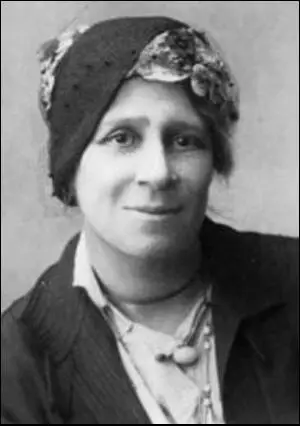
On this day in 1883 Peter Cooper, died in New York. Cooper, the son of a hat maker, was born on 12th February 1791. He received little schooling and as a child worked with his father before being apprenticed as a coach-builder in 1808.
Cooper moved to Long Island in 1812 and three years later he set up a business making machines for shearing cloth. Later he began to make furniture.
In 1828 Cooper built the Canton Iron Works in Baltimore. Soon afterwards he began work on the first steam locomotive built in America. Given the name Tom Thumb, it was completed in 1830. His business flourished and influenced by the ideas of Henry Bessemer, built the largest blast furnace in America in Philippsburg, New Jersey. He also established successful foundries at Ringwood and Durham.
Cooper became involved in laying the first Atlantic cable, and was president of the New York, Newfoundland & London Telegraph Company and the North American Telegraph Company.
A supporter of Abraham Lincoln and an opponent of slavery, Cooper was a strong advocate of enlisting black soldiers in the Union Army during the American Civil War.
In 1875 Cooper established the Greenback Party. Its main support came from farmers who were suffering from declining farm prices, high railroad rates and the government's deflationary currency policies. Cooper was the party's presidential candidate in 1876 but he won only 81,737 votes and was easily beaten by Rutherford Hayes (4,036,298) and Samuel Tilden (4,300,590). However, the party did send 15 representatives to Congress.
In 1878 members of the Greenback Party joined with urban trade union groups to establish the Greenback-Labor Party. James Weaver emerged as leader of the party and was its presidential candidate in 1880.During the campaign Weaver argued that the two major political parties had lost sight of their original democratic ideals of equal opportunity. He also claimed that the maintenance of the gold standard benefited banking interests but was driving farmers out of business. Weaver called for policies where all classes could share in the economic wealth of America.
Peter Cooper, who received the Bessemer gold medal from the Iron and Steel Institute of Great Britain in 1879, died in New York on 4th April 1883.
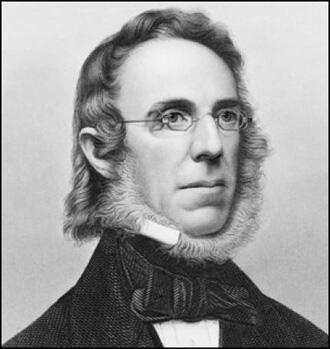
On this day in 1914 Marguerite Duras, the daughter of French schoolteachers, was born in Gia Dinh, Vietnam. At the age of seventeen Duras moved to France where she studied law and politics at the University of Paris.
After Henri-Philippe Petain signed the armistice in 1940 she joined the French Resistance and during the occupation she worked for the Cercle de la Librairie, where she was in control of paper rationing. Her husband, Robert Antelme, was also a member of the resistance and after his arrest by the Gestapo he was deported and imprisoned in Dachau.
In 1944 Duras joined the Communist Party. However, her protests concerning the treatment of writers in the Soviet Union led to her being expelled in 1950.
Her novels include The Sea Wall (1952), The Vice Consul (1966), Destroy (1969), The Lover (1985) and That's All (1995). She also wrote the film scripts for Hiroshima mon Amour (1960), India Song (1975) and The Ravishing of Lol Stein (1985).
Marguerite Duras died in Paris on 3rd March, 1996.
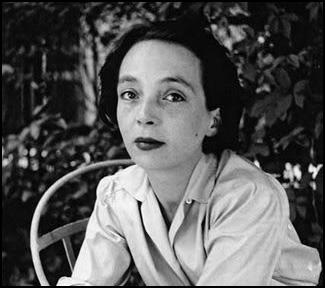
On this day in 1916 Roger Casement travels to Ireland in a German submarine. Roger Casement, the youngest son of Roger Casement (1819–1877) and Anne Jephson (1834–1873), was born on 1st September 1864 at Doyle's Cottage, Sandymount. His father, an Ulster protestant, was a captain in the Dragon Guards.
The children were brought up as Protestants, but his mother had Roger secretly baptized a Roman Catholic in Rhyl, in August 1868. Casement's mother died in childbirth in 1873, and his father in 1877. Roger went to live with his uncle, John Casement, of Magherintemple, near Ballycastle and was educated at a diocesan school in Ballymena.
After he left school in 1880 he went to Liverpool to live with Grace Bannister, his mother's sister, and her family. Casement worked as a clerk in the Elder Dempster Shipping Line Company. However, he disliked office work and when he was nineteen he became purser on the Bonny, a ship bound for the Congo. The following year he returned to Africa where he worked as a surveyor for the Belgians' Congo International Association. Between December 1889 and March 1890 he was companion to Herbert Ward on a lecturing tour in the United States of America.
Casement returned to Ireland and in 1892 he accepted his first British official post as Acting Director-General of Customs. His first consular appointment came in 1895 at Delagoa Bay in Portuguese East Africa (Mozambique). According to his biographer, David George Boyce: "At this point in his career he was stridently pro-British, fulminating against the Boers and Kruger, and was awarded the queen's South Africa medal."
In June 1902 the Foreign Office authorized him to go into the interior and send reports on the misgovernment of the Congo. His report, written in November 1903, contained evidence of cruelty and even mutilation of the Congolese. Casement was deeply upset by the British government's government failure to act on the report's recommendations. However, he was rewarded for his work with a Order of Saint Michael and Saint George (CMG) in 1905.
In July 1906 he accepted the consular post at Santos, Brazil. In 1908 Roger Casement went to Rio de Janeiro as consul-general, and in the following year he was asked by the Foreign Office to investigate atrocities in the Putumayo Basin in Peru. He wrote up his report in 1911 and was rewarded with a knighthood. Casement, who considered himself an Irish Nationalist, recorded in his diary, "I am a queer sort of British consul... one who ought really to be in jail instead of under the Lion & Unicorn."
Casement's interest in politics intensified in 1912 when the Ulster Unionists pledged themselves to resist the imposition of Irish Home Rule, by force if necessary. In 1913 he became a member of the provisional committee set up to act as the governing body of the Irish Volunteer Force (IVF) in opposition to the Ulster Volunteer Force. He helped organize local IVF units, and in May 1914 he declared that "It is quite clear to every Irishman that the only rule John Bull respects is the rifle."
Casement's activities were brought to the attention of Basil Thomson, head of the Special Branch. Thompson later admitted that it was one of his agents, Arthur Maundy Gregory, who told him about Casement's homosexuality. According to Brian Marriner: "Gregory, a man of diverse talents, had various other sidelines. One of them was compiling dossiers on the sexual habits of people in high positions, even Cabinet members, especially those who were homosexual. Gregory himself was probably a latent homosexual, and hung around homosexual haunts in the West End, picking up information.... There is a strong suggestion that he may well have used this sort of material for purposes of blackmail." Thomson later admitted that "Gregory was the first person... to warn that Casement was particularly vulnerable to blackmail and that if we could obtain possession of his diaries they could prove an invaluable weapon with which to fight his influence as a leader of the Irish rebels and an ally of the Germans."
In July 1914 Casement traveled to United States in order to raise support for the Irish Volunteer Force. Basil Thomson received information on Casement from Reginald Hall, the director of Naval Intelligence Division of the Royal Navy (NID). Hall was in charge of the code-breaking department Room 40 had discovered the plans hatched in the United States between German diplomats and Irish Republicans.
On the outbreak of the First World War Casement traveled to Berlin. According to the author of Casement: The Flawed Hero (1984): "When the First World War broke out in August he resolved to travel to Germany via Norway in order to urge on the Germans the 'grand idea’ of forming an ‘Irish brigade’ consisting of Irish prisoners of war to fight for Ireland and for Germany". His attempts to persuade Irish prisoners to enlist in his brigade met with a poor response. Private Joseph Mahony, who was in Limburg Prisoner of War Camp, later recalled: "In February 1915 Sir Roger Casement made us a speech asking us to join an Irish Brigade, that this was 'our chance of striking a blow for our country'. He was booed out of the camp... After that further efforts were made to induce us to join by cutting off our rations, the bread ration was cut in half for about two months."
On 4th April 1916, Casement was told that a German submarine would be provided to take him to the west coast of Ireland, where he would rendezvous with a ship carrying arms. The Aud, carrying the weapons, set out from Lübeck on 9th April with instructions to land the arms at Tralee Bay. Unfortunately for Casement, Reginald Hall, the director of Naval Intelligence Division of the Royal Navy (NID), had discovered details of this plan. On 12th April Casement set out in a German U-boat, but because of an error in navigation, Casement failed to arrive at the proposed rendezvous with the ship carrying the weapons. Casement and his two companions, Robert Monteith and David Julian Bailey, embarked in a dinghy and landed on Banna Strand in the small hours of 21st April. Basil Thomson, using information supplied by NID, arranged for the arrest of the three men in Rathoneen.
As Noel Rutherford points out: "Casement's diaries were retrieved from his luggage, and they revealed in graphic detail his secret homosexual life. Thomson had the most incriminating pages photographed and gave them to the American ambassador, who circulated them widely." Later, Victor Grayson claimed that Arthur Maundy Gregory had planting the diaries in Casement's lodgings.
Reginald Hall and Basil Thomson took control of the interrogation of Casement. Christopher Andrew, the author of The Defence of the Realm: The Authorized History of MI5 (2009) has argued: "Casement claimed that during the interrogation at Scotland Yard he asked to be allowed to appeal publicly for the Easter Rising in Ireland to be called off in order to 'stop useless bloodshed'. His interrogators refused, possibly in the hope that the Rising would go ahead and force the government to crush what they saw as a German conspiracy with Irish nationalists." According to Casement, he was told by Hall, "It is better that a cankering sore like this should be cut out.'' This story is supported by Inspector Edward Parker, who was present during the interrogation: "Casement begged to he allowed to communicate with the leaders to try and stop the rising but he was nor allowed. On Easter Sunday at Scotland Yard he implored again to be allowed to communicate or send a message. But they refused, saying, it's a festering sore, it's much better it should come to a head."
The trial of Roger Casement began on 26 June with Frederick Smith leading for the crown. But as David George Boyce points out: "The most controversial aspect of the trial took place outside the courts. Casement's diaries, detailing his homosexual activities, were now in the hands of the British police and intelligence officers shortly after Casement's interrogation at Scotland Yard on 23 April. There are several versions about precisely when and how the diaries were discovered, but they seem to have come to light when Casement's London lodgings were searched following his arrest. By the first weeks of May they were beginning to be used surreptitiously against him. They were shown to British and American press representatives on about 3 May and excerpts were soon widely circulated in London clubs and the House of Commons. This could not have been done without at least an expectation that those higher up would approve, though Smith opposed any use of the diaries to discredit Casement's reputation, as did Sir Edward Grey. The cabinet however made no attempt to stop these activities, the purpose of which was not to ensure that Casement would be hanged - that was inevitable - but that he should be hanged in disgrace, both political and moral."
On 29th June 1916 Casement was found guilty of high treason and sentenced to death. On 30th June he was stripped of his knighthood and on 24th July an appeal was rejected. A campaign for a reprieve was supported by leading political and literary figures, including W. B. Yeats, George Bernard Shaw, John Galsworthy, and Arthur Conan Doyle, but the British public, primarily concerned by the large loss of life on the Western Front, were unmoved by this campaign.
Roger Casement was executed at Pentonville Prison on 3rd August, 1916. John Ellis, his executioner, called him "the bravest man it ever fell to my unhappy lot to execute".
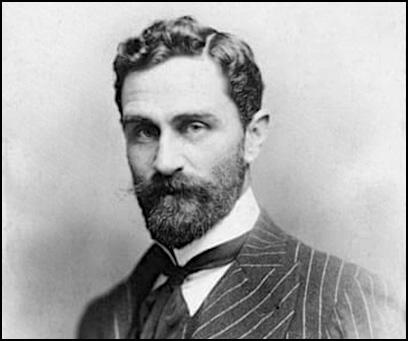
On this day in 1917 Kaiser Wilhelm II wrote about his feelings on the First World War to Chancellor Theobald von Bethmann-Hollweg. "Never has the German people shown itself so firm as during this war. The knowledge that the Fatherland is acting in bitter self-defence has exercised a wonderfully reconciling power, and in spite of all sacrifices of blood on the battlefield and severe privations at home the resolve has remained unshakable to stake the utmost for a victorious issue. National and social spirit have understood each other and become united and given us enduring strength. Everyone has felt that what has been built up in the course of long years amid many internal struggles was worthy of defence. The maintenance of the fighting force as a true people's army, and the promotion of the social progress of the people in all its classes, have been my object from the beginning of my reign. Anxious as I am, while strictly preserving the unity of people and Monarchy, to serve the interests of the whole, I am resolved, so soon as the war situation permits, to set to work on the building up of our internal political, economic, and social life. Millions of our fellow-countrymen are still in the field, and still the decision of the conflict of opinions, which is inevitable in a far-reaching change of the Constitution must, in the highest interests of the Fatherland, be postponed until the time of the return of our warriors comes, and they themselves can in counsel and action cooperate in the progress of the new era. But in order that after the successful ending of the war, which, I confidently hope, is no longer far off, whatever is necessary and appropriate in this respect may be done at once, I desire the preparations to be carried out without delay. The reform of the Prussian Diet and the liberation of the whole of our internal political life from this question is particularly near my heart. At the very beginning of the war preparations for the alteration of the franchise for the Prussian Lower House were undertaken at my suggestion. I now charge you to lay before me the definite proposals of the Ministry, in order that on the return of our warriors this work, which is fundamental for the internal construction of Prussia, may be carried out rapidly by means of legislation. After the gigantic accomplishments of the whole people in this terrible war, there is, in my opinion, no room left in Prussia for the class franchise. The Bill will further have to provide for the immediate and secret election of deputies."
On this day in 1917 Robert La Follette made a speech against US becoming involved in the First World War. "If we are to enter upon this war in the manner the President demands, let us throw pretense to the winds, let us be honest, let us admit that this is a ruthless war against not only Germany's Army and her Navy but against her civilian population as well, and frankly state that the purpose of Germany's hereditary European enemies has become our purpose... Countless millions are suffering from want and privation; countless other millions are dead and rotting on foreign battlefields; countless other millions are crippled and maimed, blinded, and dismembered; upon all and upon their children's children for generations to come has been laid a burden of debt which must be worked out in poverty and suffering... But the President proposes alliance with Great Britain, which, however liberty-loving its people, is a hereditary monarchy, with a hereditary ruler, with a hereditary House of Lords, with a hereditary landed system, with a limited and restricted suffrage for one class and a multiplied suffrage power for another, and with grinding industrial conditions for all the wageworkers. The President has not suggested that we make our support of Great Britain conditional to her granting home rule to Ireland, or Egypt, or India. We rejoice in the establishment of a democracy in Russia, but it will hardly be contended that if Russia was still an autocratic government, we would not be asked to enter this alliance with her just the same."
La Follette supported Woodrow Wilson in the 1912 presidential election and approved his social justice legislation. However, he complained that he was under the control of big business and was totally opposed to Wilson's decision to enter the First World War. Once war was declared La Follette opposed conscription and the passing of the Espionage Act. La Follette was accused of treason but was a popular hero with the anti-war movement.
Lincoln Steffens was a great supporter of La Follette: "Governor La Follette was a powerful man, who, short but solid, swift and willful in motion, in speech, in decision, gave the impression of a tall, a big man... what I saw at my first sight of him was a sincere, ardent man who, whether standing, sitting, or in motion, but the grace of trained strength, both physical and mental... Rather short in stature, but broad and strong, he had the gift of muscled, nervous power, he kept himself in training all his life. His sincerity, his integrity, his complete devotion to his ideal, were indubitable; no one who heard could suspect his singleness of purpose or his courage."
La Follette became the candidate of the Progressive Party in the 1924 presidential election. Although he gained support from trade unions, individuals like Fiorello La Guardia and Vito Marcantonio, the Socialist Party and the Scripps-Howard newspaper chain, La Follette and his running partner, Burton K. Wheeler, only won one-sixth of the votes.
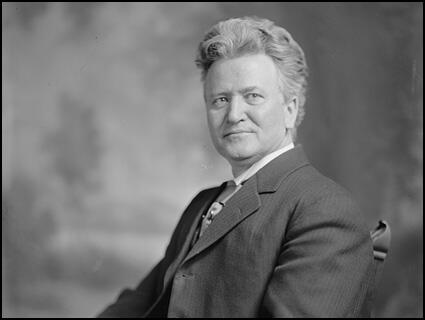
On this day in 1919 journalist Arthur Ransome was arrested under the terms of the Defence of the Realm Act. Ransome, who had been reporting on the Russian Revolution. He was interviewed by Sir Basil Thomson, Deputy Commissioner of the Metropolitan Police. Ransome later recalled: "I was shown into Sir Basil Thomson's room and asked to sit down in the famous chair where so many criminals had sat before me." After being interviewed by Thompson he was released. Thompson told William Cavendish Bentinck that he was "satisfied that he is not a Bolshevik in the sense" that other journalists such as Morgan Philips Price.
Thompson wrote: "Ransome... thinks if something is not done soon, Russia will slip into a state of anarchy, which will be far worse than the present situation. He appears to have been very closely in touch with all the Bolshevik leaders, and is perfectly frank about what they told him. I think myself that we shall he able to restrain him from bursting into print. He wants to go into the country for six months to write a hook. All he wants to be allowed to put into print for the moment is a description of the ceremony of the International, which must have been very funny."
The following day Ransome was interviewed by Reginald Leeper, of the Political Intelligence Department. He was less convinced than Thompson about the dangers that Ransome posed: "After four hours' conversation with Ransome I believe he can do more harm in this country than even Price. Lenin would not have wasted two hours with him unless he thought he could be most useful to him here. What Lenin wants in England just now are people who will take up his policy and at the same time declare they are anti-Bolsheviks. Ransome will do this to perfection, if not by writing, then at least by talking to people."
Sir Basil Thomson, who now understood the work that Ransome had been doing for the government, over-ruled Leeper. He also gave permission for Evgenia Shelepina to enter the country. Ransome wrote to Evgenia with the news: "I have at last with great difficulty obtained permission for you to join me here in England... Do not delay for a minute... I am spending the whole time here working on my book and I am waiting for you to arrive." However, the Bolshevik government would not allow her to leave and Ransome realised he would need to go back to Russia to get her.
Adam Mars Jones has argued: "Ransome knew which side his bread was buttered on, though he may not have realised how busily it was being buttered on both sides, by British and Bolshevik agencies alike. He was nothing as complicated as a double agent, but was useful to each side only if he had some standing with the other." Sir Cavendish-Bentinck reported to the Foreign Office: "He (Ransome) is really rather a coward and is trying to run with the hare and hunt with the hounds."
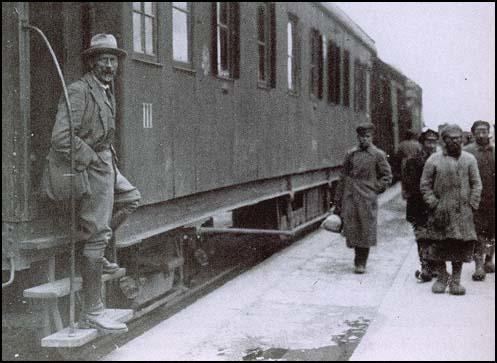
On this day in 1938 Tory MP Henry (Chips) Channon wrote in his diary about how Tory MP Robert Bower was punched by Labour Party MP, Emanuel Shinwell during a debate on the Spanish Civil War: "An incident in the House of Commons. Mr Shinwell made himself highly objectionable, and unfortunately, Commander Bower, the (Conservative) member for the Cleveland Division of Yorks shouted 'Go back to Poland' - a foolish and provocative jibe, though no ruder than many that the Opposition indulge in every day. Shinwell, shaking with fury, got up, crossed the House, and went up to Bower and smacked him very hard across the face! The crack resounded in the Chamber - there was consternation, but the Speaker, acting from either cowardice or tact, seemed to ignore the incident and when pressed, refused to rebuke Shinwell, who made an apology, as did Bower, who had taken the blow with apparent unconcern. He is a big fellow and could have retaliated effectively. The incident passed; but everyone was shocked. Bower is a pompous ass, self-opinionated, and narrow, who walks like a. pregnant turkey. I have always disliked him, and feel justified in so doing since he once remarked in my hearing 'Everyone who even spoke to the Duke of Windsor should be banished - kicked out of the country'. But the incident does not raise Parliamentary prestige, especially now, when it is at a discount throughout the world."
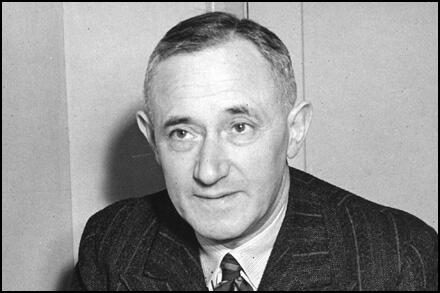
On this day in 1945 anti-fascist Kim Malthe-Bruun writes last letter to his mother Vibeke Malthe-Bruun. "I know that you are a courageous woman, and that you will bear this, but, hear me, it is not enough to bear it, you must also understand it. I am an insignificant thing, and my person will soon be forgotten, but the thought, the life, the inspiration that filled me will live on. You will meet them everywhere - in the trees at springtime, in people who cross your path, in a loving little smile - that is the great gift for which our country thirsts - something for which every humble peasant can yearn, and which he can joyously feel himself to have a part in and to be working for. Finally, there is a girl whom I call mine. Make her realize that the stars still shine and that I have been only a milestone on her road. Help her on: she can still become very happy."
He also wrote a letter to his girlfriend, Hanne: "Today I was put on trial and condemned to death. What terrible news for a little girl only twenty years old; I obtained permission to write this farewell letter. You must not busy yourself in sorrow, for you would become arrested, sunk in a worship of me and yourself, and you would lose what I have loved most in you, your womanliness. One of these days, Hanne, you will meet a man who will become your husband. Will the thought of me disturb you then? Will you perhaps then have a faint feeling that you are being disloyal to me or to what is pure and holy to you? Lift up your head, Hanne, lift up your head once again and look into my laughing blue eyes, and you will understand that the only way in which you can be disloyal to me would be in not completely following your natural instinct. You will meet this man and you will let your heart go out to him - not to numb the pain, but because you love him with all your heart. I should like to breathe into you all the life that is in me, so that thereby it could perpetuate itself and as little as possible of it be lost. Yours, but not for ever."
Kim Malthe-Bruun was born in Fort Saskatchewan, Canada in July 1923. His mother was from Denmark and in 1929 the family moved back to Europe. Malthe-Bruun was only sixteen when the German Army invaded Denmark. He became a merchant seaman and in 1943 he joined the Danish Resistance. He was arrested in December, 1944, while transporting weapons from Sweden to Denmark. He was sent to the Vestre Fængsel Prison and on 21st February, 1945 Kim was sent to the Police Headquarters for questioning. Malthe-Bruun was tortured by the Gestapo before being executed on 6th April, 1945.
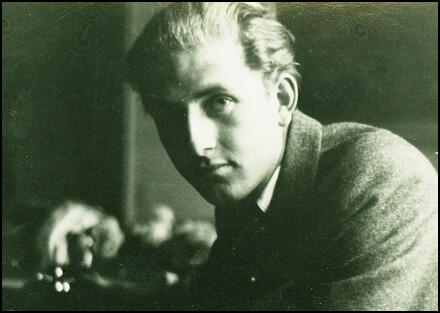
On this day in 1949 the North Atlantic Treaty Organization (NATO) was established. The treaty, signed by the Foreign Ministers of Belgium, Britain, Canada, Denmark, France, Iceland, Italy, Netherlands, Norway, Portugal and the United States, provided for mutual assistance should any one member of the alliance be attacked. Greece and Turkey joined NATO on 18th February 1952 and the Federal Republic of Germany (West Germany) on 9th May 1955.
NATO was a product of the containment policy developed by George Kennan and implemented by the president of the United States Harry S. Truman (1945-52) and his Secretary of State's, George Marshall (1947-49) and Dean Acheson (1949-52). The Truman Doctrine and the Marshall Plan were also aspects of the same policy that attempted to stop the spread of Soviet Communism.
President Dwight Eisenhower appointed John Foster Dulles as his Secretary of State in 1953. Dulles spent considerable time building up NATO as part of his strategy of controlling Soviet expansion by threatening massive retaliation in event of a war. In an article written for Life Magazine Dulles defined his policy of brinkmanship: "The ability to get to the verge without getting into the war is the necessary art." His critics blamed him for damaging relations with communist states and contributing to the Cold War.
In 1966 President Charles De Gaulle withdrew France from Nato's integrated military structure. Spain joined Nato in 1982 and in 1993 France rejoined the military command. Three former Warsaw Pact countries, Hungary , the Czech Republic , and Poland joined in 1999 (invited 1997). The 1990 reunification of Germany brought in the territory of the former country of East Germany . In May 2000 10 countries of the Baltics and Eastern Europe formed the Vilnius group to cooperate and lobby for NATO membership.
NATO launches its first ever military campaign in Sarajevo in 1995. Four years later Poland, Hungary and the Czech Republic became the first members of the former Warsaw Pact to join NATO. In 2004 Bulgaria, Estonia, Latvia, Lithuania, Romania, Slovakia, Slovenia joined. Albania and Croatia joined in 2009 and North Macedonia in 2020. Montenegro joined in 2017.
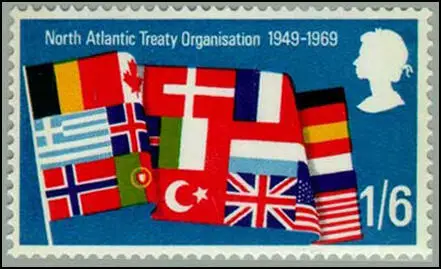
On this day in 1967 Martin Luther King made a speech on the Vietnam War at Riverside Church in New York City. King argued that the U.S. was in Vietnam "to occupy it as an American colony" and calling the U.S. government "the greatest purveyor of violence in the world today." He connected the war with economic injustice, arguing that the country needed serious moral change: "A true revolution of values will soon look uneasily on the glaring contrast of poverty and wealth. With righteous indignation, it will look across the seas and see individual capitalists of the West investing huge sums of money in Asia, Africa and South America, only to take the profits out with no concern for the social betterment of the countries, and say: 'This is not just'... A nation that continues year after year to spend more money on military defense than on programs of social uplift is approaching spiritual death."
King’s opposition to the Vietnam War really upset FBI Director J. Edgar Hoover. According to Richard N. Goodwin, Hoover told Johnson that “Bobby Kennedy was hiring or paying King off to stir up trouble over the Vietnam War.” It is true that Robert F. Kennedy, like King, was growing increasingly concerned about the situation in Vietnam. President Lyndon Baines Johnson became convinced that Kennedy was leaking information to the press about his feelings on the war. At a meeting on 6th February, 1967, Johnson told Kennedy: “I’ll destroy you and everyone one of your dove friends. You’ll be dead politically in six months.”
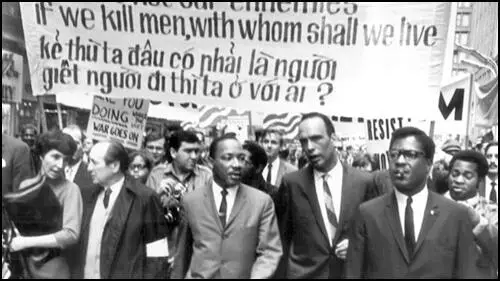
On this day in 1968 Martin Luther King is assassinated. In February, 1968, Memphis clergyman James Lawson, informed Martin Luther King about the sanitation workers’ dispute in the city. Over 90% of the 13,000 sanitation workers in Memphis were black. Men were often sent home by management during working hours and this resulted in them losing pay. Much of the equipment they used was old and in a bad state of repair. The dispute began when two sanitation workers, Echole Cole and Robert Walker were killed by a malfunctioning “garbage packer” truck. There was no company insurance scheme and the men’s families did not receive any compensation except for a month’s pay and a contribution towards funeral expenses.
The local branch of the Association of Federal, State, County and Municipal Employees (AFSCME) threatened strike action unless working conditions improved in Memphis. When negotiations failed to achieve an acceptable solution to this problem, the sanitation workers went on strike. A protest march on 23 rd February, ended in violence when the local police used Mace on the marchers. At this point, Rev. James Lawson, one of the founders of the Southern Christian Leadership Conference (SCLC), became chairman of the strike strategy committee. The Community on the Move for Equality (COME), a coalition of labour and civil rights groups, also gave its support to the sanitation workers. Roy Wilkins of the National Association of the Advancement of Colored People (NAACP) and Bayard Rustin of the Congress on Racial Equality (CORE), agreed to speak at a strike meeting on 14 th March. Martin Luther King also agreed to help and it was announced he would speak at a public meeting in Memphis on 18 th March.
At the meeting King expressed his solidarity with the sanitation workers and called for a general strike to take place in Memphis. This caused create concern amongst the ruling elite. Many people interpreted the idea of a general strike as a tactic that had been employed by revolutionaries in several European countries. The strategy of King seemed to be an attempt to link the campaign against poverty with the civil rights struggle and the protests against the war in Vietnam. In his speeches King argued that the money being spent on the war was making it more difficult for Lyndon B. Johnson to fulfil the promises he had made about improving America’s welfare system.
James Lawson later claimed that King “saw the Memphis sanitation workers’ strike as the beginning of a non-violent revolution that would redistribute income.” He argued his long term plan was to “shut down the nation’s capital in the spring of 1968 through massive civil disobedience until the government agreed to abolish poverty.” He added that the government became especially upset after he began making speeches against the Vietnam War.
King’s strategy of linking poverty, civil rights and the Vietnam War seemed to be mirroring the presidential campaign of Robert F. Kennedy. Both men appeared to be seriously threatening the status quo and in that sense were acting as revolutionaries. Recently released FBI files show that during this period J. Edgar Hoover reported to Johnson that Kennedy and King were working together in order to undermine his presidency.
On 28th March, 1968, King led a march from Clayborn Temple to the Memphis City Hall. Although the organizers had ordered the marchers to refrain from any acts of violence, groups of young people ignored the marshals’ instructions and created a great deal of damage to shops on the way to the city hall. A sixteen-year-old boy, Larry Payne, was shot dead by the police who claimed he was a looter. An eyewitness said that Payne had his hands up when shot.
King was convinced that the violence on the march had been caused by government provocateurs. According to Coretta Scott King, her husband returned to Memphis on 3rd April to prepare for a truly non-violent march and to prove SCLC could still carry out a pacifist campaign in Washington. That night King made a speech at the Mason Temple. The I've Been to the Mountaintop speech It ended with the following words: "Well, I don’t know what will happen now; we’ve got some difficult days ahead. But it really doesn’t matter with me now, because I’ve been to the mountaintop. And I don’t mind. Like anybody, I would like to live a long life - longevity has its place. But I’m not concerned about that now. I just want to do God’s will. And He’s allowed me to go up to the mountain. And I’ve looked over, and I’ve seen the promised land. I may not get there with you. But I want you to know tonight , that we, as a people, will get to the promised land. So I’m happy tonight; I’m not worried about anything; I’m not fearing any man. Mine eyes have seen the glory of the coming of the Lord."
After the meeting King and his party were taken to the Lorraine Motel. The following day King was shot and killed as he stood on the balcony of the motel. His death was followed by rioting in 125 cities and resulted in forty-six people being killed. Two months later, James Earl Ray was arrested in London and extradited to the United States. He pleaded guilty to King’s murder and was sent to jail for ninety-nine years.
People close to King were convinced that the government was behind the assassination. Ralph Abernathy, who replaced King as head of the SCLC, claimed that he had been killed “by someone trained or hired by the FBI and acting under the orders from J. Edgar Hoover”. Whereas James Lawson, the leader of the strike in Memphis remarked that: “I have no doubt that the government viewed all this (the Poor People’s Campaign and the anti-Vietnam War speeches) seriously enough to plan his assassination.”
